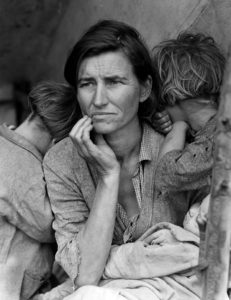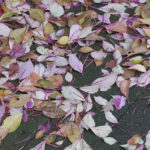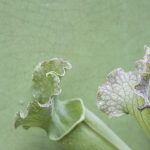“To know ahead of time what you’re looking for means you’re then only photographing your own preconceptions, which is very limiting, and often false.”

Nevenstaande foto (Migrant Mother, 1936) is misschien wel de bekendste foto van Dorothea Lange. Dorothea is beroemd voor haar studies van werk- en daklozen in Amerika gedurende de Depressie van de jaren ’30, maar ze heeft ook daarna mensen aan de rand van de samenleving in beeld gebracht met het doel hun leefomstandigheden openbaar te brengen.
De quote heeft voor mij verbinding met contemplatieve fotografie: dit gaat heel erg over zien zonder verwachtingen en vooronderstellingen, want die beperken je en zijn toch vaak verkeerd.
Hieronder staat in het Engels beschreven hoe Dorothea de foto heeft genomen. Er spreekt een enorme zachtheid en respect uit, geen agressie van iets willen pakken of hebben. Ook dat hoort bij contemplatieve fotografie.
The image on the left (Migrant Mother, 1936) is probably is most well know photograph of Dorothea Lange. Dorothea was renown for her studies of unemployed and homeless people during the Great Depression, but she als portrayed people on the edges of society beyond that with the goal to publish their living circumstances.
To me the quote is linked to contemplative photography as this kind of photography is also about looking without preconceptions.
In 1960, Lange spoke about her experience taking the photograph:
I saw and approached the hungry and desperate mother, as if drawn by a magnet. I do not remember how I explained my presence or my camera to her, but I do remember she asked me no questions. I made five exposures, working closer and closer from the same direction. I did not ask her name or her history. She told me her age, that she was thirty-two. She said that they had been living on frozen vegetables from the surrounding fields, and birds that the children killed. She had just sold the tires from her car to buy food. There she sat in that lean-to tent with her children huddled around her, and seemed to know that my pictures might help her, and so she helped me. There was a sort of equality about it.
This little story touched me; it echoes softness and respect and not the aggression of wanting to have or grab something. And that also is part of contemplative photography.


